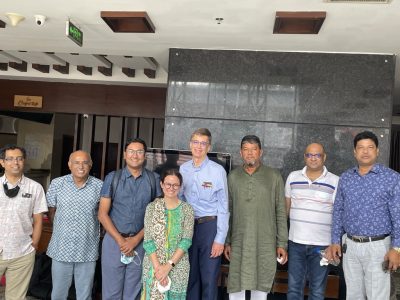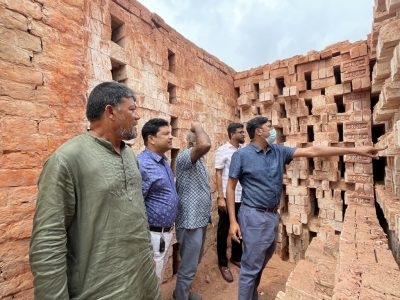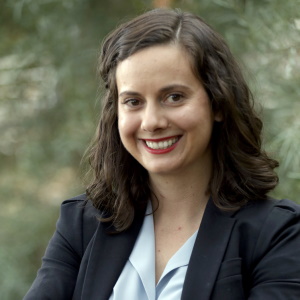
UConn School of Public Policy (SPP) Professor Nina Brooks is currently a Co-Investigator on a project entitled “Improving Brick Manufacturing in Bangladesh to Promote Clean Air and Better Health.” This ongoing collaborative study is led by Stanford University with partners in Bangladesh (icddr,b and the Bangladesh University of Engineering and Technology) and India (Greentech Knowledge Solutions). The team conducted a pilot study in Jashore District, Bangladesh between October 2021 – June 2022.
Nina explains,
In the pilot, we enrolled 30 traditional kilns in a pilot randomized controlled trial to field test interventions. We delivered intensive training on technical improvements to kiln operation, as well as an additional experimental arm that encouraged owners to incentivize workers to take-up the recommended intervention practices.
We delivered intensive training on technical improvements to kiln operation, as well as an additional experimental arm that encouraged owners to incentivize workers to take-up the recommended intervention practices. There was high demand for the intervention and 60% of kilns assigned to both experimental arms adopted the two most important technical improvements.
Additionally, two kilns assigned to the control arm and three non-study kilns sent workers to our intervention kilns or contacted our project team to learn the techniques promoted by our intervention. Kiln owners that participated in the pilot study reported high levels of satisfaction with the quality of bricks and reduced coal spending in our qualitative interviews. Although the pilot was not powered to detect impacts on exploratory outcomes related to kiln efficiency, emissions, or profitability, the evidence suggests an improvement in combustion efficiency and an increase in economic returns to owners.
Among kilns that adopted the two most important technical intervention components we saw a 35.9% reduction in the CO/CO2 ratio, an 8.3% reduction in specific energy consumption, a 14.1% increase in the percentage of Class-1 bricks produced, a 6.9% increase in the value of production per brick, and a 19.7% reduction in coal spending per brick relative to non-adopters. Despite efforts to promote modern kilns, traditional kilns continue to be a large part of the Bangladeshi brick market. Thus, improvements to the efficiency of traditional kilns will be critical for reducing emissions from the industry and we have demonstrated a successful approach to increasing adoption of operational improvements.

In August, the entire project team convened in Bangladesh to plan the next phase of the project, as well as meet with and present results to the kiln owners who participated in the pilot study. Two photos from her journey are included in this recap!
In September, the team was awarded a grant from the JPAL/King Climate Action Initiative to co-fund (along with Stanford Impact Labs) a large-scale randomize controlled trial in 300 kilns based on the pilot study.
The study was officially launched earlier this month and is currently collecting baseline data.
 In June, Nina and her colleagues discussed the implications of the reversal of Roe vs. Wade on U.S. influence on global abortion policy and politics. Their article entitled “A Post-Roe World? Why Abortion Battles in America Won’t Halt Reform Abroad” was published in Foreign Affairs this past June. Her co-authors include:
In June, Nina and her colleagues discussed the implications of the reversal of Roe vs. Wade on U.S. influence on global abortion policy and politics. Their article entitled “A Post-Roe World? Why Abortion Battles in America Won’t Halt Reform Abroad” was published in Foreign Affairs this past June. Her co-authors include:
- Minzee Kim, Associate Professor of Sociology at Ewha Womans University in South Korea
- Elizabeth Heger Boyle, Professor of Sociology at the University of Minnesota
- Wesley Longhofer, Associate Professor of Organization and Management at the Goizueta Business School at Emory University